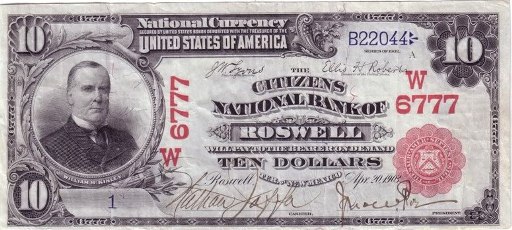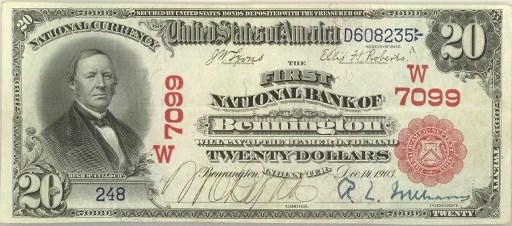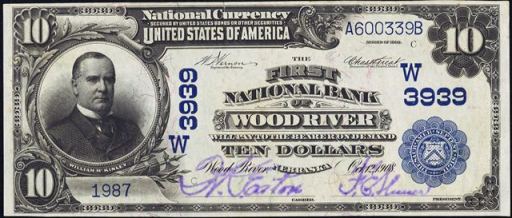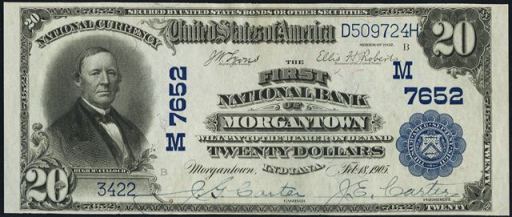The American National Bank Of Holdenville
The American National Bank Of Holdenville in Oklahoma printed $62,700 dollars worth of national currency. A production number that low doesn’t save room for many survivors. Currency from this bank will be rare. This national bank opened in 1905 and stopped printing money in 1920, which equals a 16 year printing period. That is actually quite brief in terms of bank existence. During its life, The American National Bank Of Holdenville issued 4 different types and denominations of national currency. We have examples of the types listed below. Your bank note should look similar. Just the bank name will be different. For the record, The American National Bank Of Holdenville was located in Hughes County. It was assigned charter number 7619.
We buy all national currency. Please call or email us for a quote. Sales@AntiqueMoney.com
The American National Bank Of Holdenville in Oklahoma issued 300 sheets of $10 1902 territorial red seal national bank notes. Collectors love to buy notes from such a small print run. It doesn’t get much smaller than under 500 sheets printed. This denomination and type was the most prolifically issued territorial note. Some can be quite rare. There is a hierarchy in terms of rarity. Red seals from Hawaii are the absolute rarest. In fact, none from Hawaii are currently known to exist. Ten dollar red seals from Porto Rico are also extremely rare, as are red seals from Alaska. The average collector is most likely to encounter red seals from Arizona, New Mexico, and Oklahoma. There were far more territorial banks in Oklahoma during the red seal period than any other state, so notes from Oklahoma are the most common. However, most all red seals should be worth more than $10,000, and sometimes considerably more. William McKinley is pictured on the left hand side of each bill. The number under McKinley is the bank serial number. If that number is #1, then you can expect an additional premium on the value.
1902 $10 Red Seal Territorial National Bank Note
The American National Bank Of Holdenville printed 300 sheets of $20 1902 territorial red seal national bank notes. That of course equals the number of sheets printed for the ten dollar denomination. A total of 259 national banks in the country issued $20 territorial red seals. There are currently only about 30 of them known to exist, and that total includes all national banks. That survival rate is really poor. That means that these notes are rare and valuable. They were usually printed in small quantities and very few new ones are found these days. High grade examples are scarce as are notes printed by banks not located in Oklahoma.
1902 $20 Red Seal Territorial National Bank Note
The American National Bank Of Holdenville also printed 954 sheets of $10 1902 blue seal national bank notes. In the scheme of things that is a really tiny printing number. You are likely dealing with a true rarity. 1902 $10 blue seal bank notes all have a portrait of William McKinley on them. Values can range from as little as $40 up to over $10,000. There really is no trick to know what is rare and what is common by just doing an internet search. You really need to work with an expert (like us) in order to determine the value of your specific bank note. There are at least ten different factors than can make some 1902 $10 blue seals worth more than others. We know exactly what to look for and we would be happy to provide a free appraisal and our best offer.
1902 $10 Blue Seal National Bank Note
The American National Bank Of Holdenville also printed 954 sheets of $20 1902 blue seal national bank notes. The same rarity rules for 1902 $10 blue seals also apply to $20 blue seals. Just remember that $20 bills are by nature three times rarer (unfortunately they don’t command a premium over other denominations). Hugh McCulloch is pictured on the front of each bill. Contact us if you need pricing help.
1902 $20 Blue Seal National Bank Note



